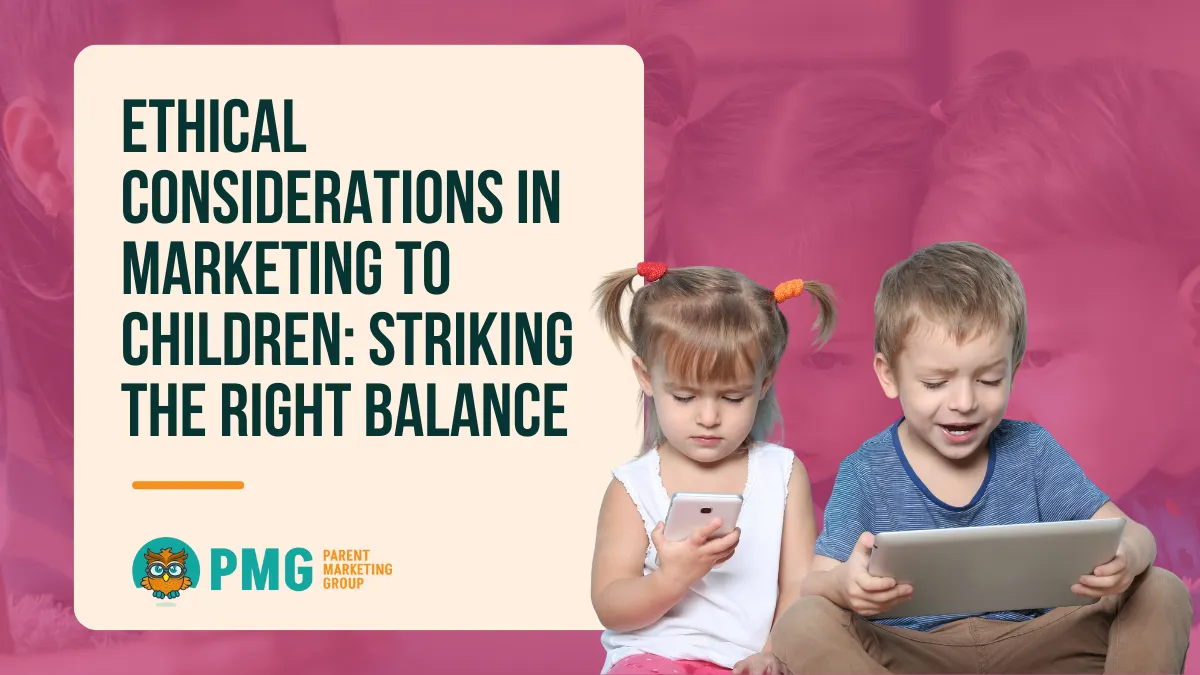Marketing to children presents unique ethical considerations that businesses must navigate thoughtfully. Ensuring that strategies align with child development and parental values is key when marketing to children.
It’s essential to balance engagement with responsibility, delivering content that educates and empowers without exploiting youthful vulnerability. Parents expect brands to act with integrity, making trust a campaign’s cornerstone. Striking this balance allows businesses to build lasting relationships with families while maintaining ethical practices in a child-centric market.
Understanding Child Targeted Advertising

Child targeted advertising is a powerful yet nuanced tool that requires careful consideration. It involves strategies designed to appeal to younger audiences through TV commercials, online ads, or in-store displays. However, marketing to children demands a unique approach due to their developmental stages and the ethical implications that come with them.
Critical Characteristics of Child-Targeted Advertising
Effective child advertising often includes specific elements designed to attract and engage children, such as:
- Bright, colorful visuals that capture attention
- Memorable characters or mascots that children can relate to
- Straightforward messaging tailored to their comprehension levels
- Interactive features that encourage participation, such as games or challenges
These features make ads more appealing to children but must be employed thoughtfully to avoid exploitation.
Ethical Considerations
The ethical responsibility in child-targeted advertising cannot be overstated. Children are more impressionable and often cannot distinguish between advertising and regular content. To ensure ethical practices, businesses should focus on:
- Avoiding deception: Ads should be honest, avoiding exaggerated claims that could mislead children.
- Parental involvement: Encourage kids to involve their parents in decisions influenced by advertising.
- Educational value: Provide educational content that adds value to both the child and the parent.
By maintaining transparency and avoiding manipulative techniques, companies can build trust with families while staying true to ethical standards.
The Role of Regulation
Various legal frameworks govern child-targeted advertising to protect the rights and safety of children. These include:
- Children’s Advertising Review Unit (CARU): Establishes guidelines for fair advertising practices directed at children.
- Children’s Online Privacy Protection Act (COPPA): Protects the privacy of children under 13 in the digital space.
Understanding child-targeted advertising is more than just creating catchy content. It’s about balancing engagement with ethical responsibility, ensuring that campaigns appeal to children in a way that is appropriate and compliant with legal standards. This thoughtful approach fosters trust with children and their families, creating a positive and lasting brand relationship.
Benefits of Marketing to Children

When done ethically and responsibly, marketing to children offers significant business advantages. It provides immediate returns and creates long-term opportunities for brand growth. By establishing connections with young audiences early, companies can build lasting brand loyalty and influence future purchasing decisions.
Early Brand Loyalty
One of the primary benefits of marketing to children is the potential to foster early brand loyalty. When children are introduced to a brand at a young age, they are likelier to develop a lasting preference for it. This early connection can result in lifelong brand advocates who continue to purchase and promote the brand as they grow older. For businesses, this means creating a loyal customer base that extends far into the future.
Influence on Parental Spending
Children have a notable impact on household purchasing decisions. They often influence parents’ choices when buying toys, clothes, food, and even larger purchases like family vacations. Companies can tap into this indirect purchasing power by engaging with children through effective marketing strategies.
Some key areas where children’s influence is strongest include:
- Toys and games
- Food and snacks
- Family entertainment and experiences
- Clothing and accessories
Understanding this influence can help businesses tailor their marketing efforts to children and parents, maximizing their overall impact.
Long-Term Revenue Potential
Marketing to children also provides long-term revenue potential. As children grow and their preferences evolve, they carry with them the brand relationships formed during their early years. This creates opportunities for businesses to nurture a customer base that spans generations. For instance, a brand that connects with children today could see continued loyalty through their teens and into adulthood when they begin making independent purchasing decisions.
Fostering Positive Brand Perception
Another critical benefit of marketing to children is fostering a positive brand perception. Companies can build goodwill with children and their parents when creating fun, engaging, and educational content. By prioritizing ethical marketing practices and providing value in their campaigns, businesses can create a favorable reputation that lasts well into the future.
By tapping into the unique benefits of marketing to children, businesses can create meaningful relationships, drive immediate sales, and establish a foundation for long-term growth. When executed thoughtfully, these efforts can yield significant rewards while maintaining ethical standards and trust with families.
How to Effectively Market to Children
Marketing to children requires a blend of creativity, ethics, and strategy. Since young audiences are highly impressionable, businesses must focus on building meaningful and appropriate connections. Below are some essential strategies to ensure effective and responsible marketing to children.
Create Engaging, Age-Appropriate Content
Children respond to content that is fun, interactive, and easy to understand. When creating ads, brands should ensure the material fits the child’s developmental stage. Effective strategies include:
- Bright, colorful visuals: Use vibrant images that catch attention.
- Interactive elements: Games, quizzes, or puzzles make the content more engaging.
- Storytelling: Characters or narratives that children can relate to will enhance their connection to the brand.
By delivering content that entertains while educating, brands can foster positive relationships with young audiences.
Maintain Ethical Standards
Marketing to children comes with significant ethical responsibility. Given that children may need to comprehend the commercial intent behind ads, businesses must prioritize transparency and fairness in their campaigns. Key guidelines include:
- Avoiding manipulation: Keep messages honest and free from deception.
- Encouraging parental involvement: Suggest that children consult their parents or guardians before making decisions influenced by ads.
- Offering educational value: Incorporate learning elements into the content whenever possible.
Adhering to ethical guidelines can help companies build trust with children and their families, strengthening long-term brand loyalty.
Utilize Platforms Children Frequently
To effectively reach children, businesses should market on platforms that kids naturally gravitate toward, such as:
- Children’s TV shows or streaming services
- Educational websites and apps
- Social media platforms with appropriate privacy settings for young users
By understanding where children spend their time, brands can position themselves in familiar and engaging environments.
Comply with Legal Regulations
When marketing to children, businesses must follow legal frameworks designed to protect minors. Regulations like COPPA (Children’s Online Privacy Protection Act) ensure that data collection and advertising practices are safe and transparent. Important compliance points include:
- Data privacy: Safeguard children’s personal information online.
- Ad transparency: Clearly distinguish advertisements from regular content.
By following these legal guidelines, businesses can avoid regulatory issues while maintaining responsible marketing practices.
Regulatory Guidelines for Marketing to Children
Marketing to children is subject to strict regulations designed to protect their privacy and ensure ethical advertising practices. Businesses must follow these guidelines to maintain compliance and avoid potential legal consequences. Understanding these rules is crucial for any company engaging in child-targeted marketing.
Children's Online Privacy Protection Act (COPPA)
The Children’s Online Privacy Protection Act (COPPA) regulates the collection and use of personal information from children under 13. Essential compliance requirements include:
- Parental consent: Businesses must obtain verifiable parental consent before collecting any personal data from children.
- Clear privacy policies: Companies must have transparent privacy guidelines that explain what data is collected and how it will be used.
- Limited data collection: Only essential data should be gathered and securely stored.
These guidelines protect children’s data while allowing businesses to engage responsibly in online marketing.
Children's Online Privacy Protection Act (COPPA)
The Children’s Advertising Review Unit (CARU) provides self-regulatory guidelines for businesses advertising to children. These include:
- Truthfulness: Ads should not be misleading or deceptive, particularly given children’s limited ability to understand advertising intent.
- Age-appropriate content: Advertisements should be tailored to the appropriate age group, ensuring that messaging is suitable and understandable.
- Avoiding undue influence: Ads should not manipulate children’s emotions or exploit their vulnerability to persuade them to purchase a product.
Following CARU guidelines helps businesses align their advertising strategies with ethical standards while building trust with families.
Children's Online Privacy Protection Act (COPPA)
In the European Union, the General Data Protection Regulation (GDPR) includes specific provisions for children’s data. Key points include:
- Parental consent: Similar to COPPA, GDPR requires parental consent to work with the personal data of children under 16.
- Right to be forgotten: Children (or their guardians) can request that a company delete their data from its records.
- Data minimization: Companies are required to collect only the minimum data necessary to provide their services.
GDPR emphasizes protecting children’s digital rights and holds businesses accountable for handling young users’ data.
Impact of Non-Compliance
Failure to follow these regulations can lead to:
- Hefty fines
- Reputational damage
- Loss of customer trust
By staying informed and compliant with COPPA, CARU, and GDPR, businesses can responsibly engage with younger audiences while safeguarding children’s rights and privacy.
Conclusion
Marketing to children offers businesses the chance to build early brand loyalty, influence household decisions, and foster long-term customer relationships. However, the key to success is maintaining ethical practices, adhering to regulatory guidelines, and ensuring your marketing strategies are engaging and responsible. By understanding the unique needs of young audiences and complying with legal standards, companies can create lasting, positive connections with both children and their families.
Ready to elevate your child-focused marketing efforts? Get in touch with us today to learn more! Visit our contact page or call us at (706) 899-3707 to get started!







